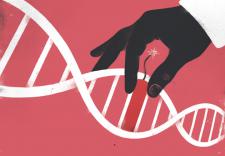Are we mapping a path to CRISPR babies?
By Katie Hasson and Marcy Darnovsky,
The Hill
| 09. 13. 2020
In November 2018, at a gene-editing “summit” hosted by scientific societies from the U.S., the U.K., and Hong Kong, a Chinese researcher announced that he had created the world’s first genetically modified babies. He Jiankui fully expected to be celebrated for a scientific breakthrough; he mentioned the Nobel Prize. Instead, he was almost universally condemned.
Key figures associated with the U.S. National Academies and U.K. Royal Society joined in the criticism but did not reject heritable genome editing. Instead, they objected to the Chinese researcher’s timing. It was too soon, they said. It hadn’t been done as they thought it should have been. But according to the researcher now being called a “rogue,” it was the National Academies’ 2017 report that had given him the green light for his experiments.
In the aftermath of this headline-grabbing debacle, the scientific societies decided on a do-over. They declared it time to “define a rigorous, responsible translational pathway” toward clinical use of heritable genome editing. They set up a carefully selected international commission with the mandate to map the scientific details...
Related Articles
By Diaa Hadid and Shweta Desai, NPR | 01.29.2026
MUMBRA, India — The afternoon sun shines on the woman in a commuter-town café, highlighting her almond-shaped eyes and pale skin, a look often sought after by couples who need an egg to have a baby.
"I have good eggs,"...
By George Janes, BioNews | 01.12.2026
A heart attack patient has become the first person to be treated in a clinical trial of an experimental gene therapy, which aims to strengthen blood vessels after coronary bypass surgery.
Coronary artery bypass surgery is performed to treat...
By Staff, ScienceDaily | 01.05.2026
Scientists at UNSW Sydney have developed a new form of CRISPR technology that could make gene therapy safer while also resolving a decades-long debate about how genes are switched off. The research shows that small chemical markers attached to DNA
...
Following a long-standing CGS tradition, we present a selection of our favorite Biopolitical Times posts of the past year.
In 2025, we published up to four posts every month, written by 12 authors (staff, consultants and allies), some in collaboration and one simply credited to CGS.
These titles are presented in chronological order, except for three In Memoriam notices, which follow. Many more posts that are worth your time can be found in the archive. Scroll down and “VIEW...




